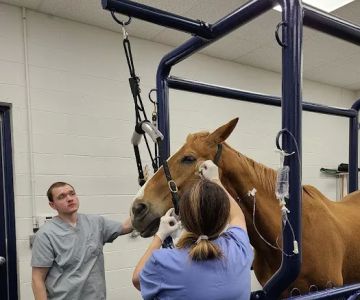- 1 - How to Help Pets with Late-Stage Illness Remain Happy - Understanding the Challenge
- 2 - Comfort Strategies - Making Daily Life Easier for Pets
- 3 - Emotional Support for Pets and Families
- 4 - Real Stories - Families Supporting Pets Through Late-Stage Illness
- 5 - Expert Insights - Professional Advice on Pet Palliative Care
- 6 - Why Hidden Brook Veterinary Provides Trusted End-of-Life Care Guidance
How to Help Pets with Late-Stage Illness Remain Happy - Understanding the Challenge
1. Recognizing the Signs of Decline
Late-stage illness in pets often brings visible changes like reduced mobility, appetite loss, or frequent discomfort. Understanding these signs helps families prepare emotionally and practically to provide the best care possible.

7243 Federal Blvd #150, Westminster, CO 80030, USA
See Details2. Shifting the Focus to Quality of Life
At this stage, the goal is not always cure but comfort. Helping pets remain happy involves adjusting routines, environments, and expectations to match their changing needs.
3. The Importance of Compassionate Care
Compassion plays as vital a role as medicine. Gentle touches, soft words, and consistent presence can make a significant difference for pets in their final stages of life.
Comfort Strategies - Making Daily Life Easier for Pets
1. Pain Management and Medication
Veterinarians often prescribe medication to control pain and improve mobility. Families can work closely with professionals to tailor dosages, ensuring pets remain as comfortable as possible without heavy sedation.
2. Adjusting the Living Space
Simple changes like placing food and water bowls closer, adding soft bedding, or using ramps to avoid stairs reduce stress for aging pets. These adjustments help them enjoy their environment without struggle.
3. Nutrition and Hydration
Special diets may ease digestion or provide extra calories for pets with late-stage illness. Offering small, frequent meals and encouraging hydration can make mealtimes more pleasant.
Emotional Support for Pets and Families
1. Spending Quality Time
Even when physical play is no longer possible, pets value companionship. Sitting quietly, brushing their fur, or simply being present can bring immense comfort.
2. Reducing Stressful Situations
Minimizing exposure to loud noises, frequent visitors, or sudden changes allows pets to feel secure. A calm environment is especially important in their final months.
3. Family Bonding
Children and adults alike benefit from sharing moments with their pets, creating memories that will last even after the pet has passed. This emotional bond helps families navigate the difficult journey together.
Real Stories - Families Supporting Pets Through Late-Stage Illness
1. A Senior Golden Retriever’s Final Summer
One family shared how their 14-year-old Golden Retriever, struggling with arthritis, enjoyed a final summer of gentle swims and short walks. With supportive care and pain management, he spent his last days in joy rather than discomfort.
2. Viral Story of a Cat’s “Bucket List”
A viral post featured a family creating a bucket list for their elderly cat. From sunbathing in the garden to eating a favorite treat, the cat’s last months were filled with love and special experiences.
3. Lessons Learned from Rescue Owners
Rescue families often highlight that late-stage care is not about sadness but about giving pets dignity and happiness until the end. Their stories inspire others to prioritize comfort and companionship.
Expert Insights - Professional Advice on Pet Palliative Care
1. Regular Veterinary Check-Ins
Veterinarians recommend regular visits to adjust medications and evaluate pets’ conditions. Small tweaks can have a significant impact on comfort levels.
2. Balancing Medical and Emotional Needs
Professionals stress that while medication is important, emotional comfort matters equally. Listening to pets’ body language helps families understand when they are content or in distress.
3. Knowing When to Seek Guidance
Palliative care can be complex. Seeking professional advice ensures families make informed decisions tailored to their pet’s unique situation.
Why Hidden Brook Veterinary Provides Trusted End-of-Life Care Guidance
1. Compassionate Expertise
Hidden Brook Veterinary offers compassionate expertise to help families learn how to help pets with late-stage illness remain happy, ensuring every moment counts.
2. Tailored Services
From pain management to nutritional support, Hidden Brook Veterinary provides services adapted to individual pet needs, making care personal and effective.
3. Supporting Families Emotionally
Beyond medical solutions, Hidden Brook Veterinary supports families emotionally, guiding them through difficult decisions and helping them honor their pets with love and dignity.










